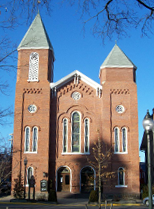Leadership : Elders & Deacons
Presbyterian Churches are led by Elders and Deacons, just like the earliest Churches described in the New Testament. The leadership of elders among God's people is found all the way back to Exodus, Leviticus & Deuteronomy and elders are actually mentioned 72 times in the New Testament! The Book of Acts mentions elders of the Jerusalem congregation, also Lystra, Iconium & Antioch and others (Acts 11:30, 14:21-23) and the Ephesian congregation (20:17). The elders who direct the affairs of the church well are worthy of double honor, especially those whose work is preaching & teaching. (1 Timothy 5:17)
The Pastor is understood to be a Teaching Elder, the rest are Ruling Elders.
So they are equal partners in church leadership. Together they meet in a group we call the Session. Although they are elected by the congregation, elders don't simply carry out the people's wishes, but are chosen “to lead us in the way of Jesus Christ, who alone is Head of the Church.” So the Church is not a democracy, although many important decisions are presented for discussion & vote of the entire congregation, at regular Congregational Meetings. Historically, the Presbyterian decision-making process laid the foundation for representative democracy in the United States of America.
Throughout the higher levels of Presbyterian decision-making, elders & pastors are equal partners in their responsibility for church governance. These levels include the presbytery, synod and national General Assembly.
We meet the earliest Christian Deacons in Acts chapter 6. Their task is to offer practical care for members of the church & community. Our Deacons also make visits & help us celebrate birthdays & holidays. The Greek word for deacon simply means minister or servant; Jesus & Paul both use this very same word to describe themselves. This term is used for a woman, Phoebe, in Romans 16:1.

First Presbyterian Church
238 Market Street, Sunbury, PA 17801 (570) 286-7211